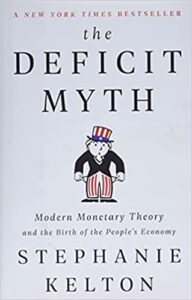Not way back, policymakers like Rep. Alexandria Ocasio-Cortez had been enamored of one thing known as Fashionable Financial Principle (MMT). This idea begins with a banal statement — {that a} authorities that points the forex its money owed are denominated in want by no means (technically) go bankrupt — and, on that foundation, argues that we don’t want to fret in regards to the finances deficit. As a number one MMTer, economist Stephanie Kelton, argued in her 2020 e-book The Deficit Fable: Fashionable Financial Principle and the Delivery of the Individuals’s Economic system:
Uncle Sam has one thing the remainder of us don’t—the ability to concern the US greenback. Uncle Sam doesn’t must give you {dollars} earlier than he can spend. The remainder of us do. Uncle Sam can’t face mounting payments he can’t afford to pay. The remainder of us would possibly. Uncle Sam won’t ever go broke.
MMT appealed to many, like AOC, as a result of it appeared to supply the Thinker’s Stone of economics, the fabled free lunch. However it didn’t.
As Kelton wrote:
Simply because there aren’t any monetary constraints on the federal finances doesn’t imply there aren’t actual limits to what the federal government can (and will) do. Each economic system has its personal inner velocity restrict, regulated by the provision of our actual productive assets— the state of expertise and the amount and high quality of its land, staff, factories, machine, and different supplies. If the federal government tries to spend an excessive amount of into an economic system that’s already working at full velocity, inflation will speed up. There are limits. [Emphasis added]

Policymakers, then, ought not be trying on the deficit when setting fiscal coverage, however on the total economic system – “…the federal government’s finances isn’t speculated to steadiness. Our economic system is,” Kelton wrote – and to search out steadiness or imbalance within the economic system we had to take a look at the speed of inflation. Kelton defined that:
A deficit is just proof of overspending if it sparks inflation.
…
Lastly, the federal authorities has traditionally nearly at all times stored its deficit too small. Sure, too small! Proof of a deficit that’s too small is unemployment. After all, MMT acknowledges that deficits may also be too huge. However Senator Enzi had all of it improper. A fiscal deficit isn’t proof of overspending. For proof of overspending, we should consider inflation.
However we didn’t want to fret about this. This was, MMTers instructed us, “the prevailing period of too-low inflation”.
That period is now over. Briefly put, when COVID-19 hit, the federal authorities borrowed huge and the Federal Reserve printed huge, utilizing the brand new cash to purchase authorities debt and maintain the federal government’s borrowing prices down. This cash was spent into an economic system whose capability to provide the products and providers to spend it on was constrained by shutdowns and different anti-COVID-19 measures. We hit these limits.
Given MMTers had acknowledged inflation as an issue to be remedied, what did they counsel because the treatment? What would MMTers have been doing these final couple of years if they’d been in cost?
As a result of they thought that we had been in an “period of too-low inflation”, MMTers like Kelton spent way more time telling us about all of the spending they might do than about how they might take care of the inflation that may come up in consequence. However they weren’t silent on the matter. Kelton attracts on the work of economist Abba P. Lerner:
To take care of full employment and maintain inflation low, Lerner needed the federal government to maintain fixed watch on the economic system. If one thing occurred to maneuver the economic system out of steadiness, Lerner needed to the federal government to reply with a fiscal adjustment, both altering taxes or altering authorities spending.
…
If inflation started to creep up, Lerner believed that Congress may reply by elevating taxes or slicing again its personal expenditures.
In different phrases, MMTers would struggle inflation with fiscal austerity and, presumably, they might take care of excessive inflation resembling we now have had not too long ago with notably strict fiscal austerity.
The Federal finances may definitely use a little bit of austerity, however it isn’t clear that it will do very a lot to struggle inflation: how would you get measures like that via Congress? How would fiscal measures repair a financial drawback? Governments within the Nineteen Sixties and Seventies, when Lerner’s affect was at its peak, did, the truth is, use taxes as a device to struggle inflation and with little success as a result of they stored on printing cash.
Both manner, the free lunch that attracted so many to MMT was by no means actually there. MMTers, in equity to them, by no means fully pretended that it was. One wonders whether or not AOC nonetheless helps MMT now that it dictates fiscal austerity?
John Phelan is an Economist at Middle of the American Experiment.







